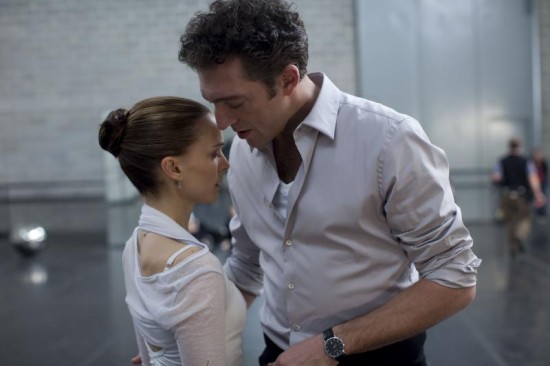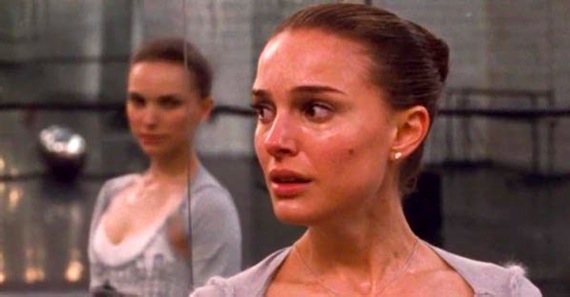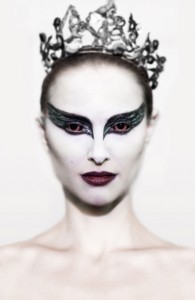
An artistic work of severe passion and visual dazzle. Some will find it superb and depressing at the same time, most others will be awestruck and exhilarated by the way it sprouts fatalism within the world of ballet. Black Swan is very much about paranoid schizophrenia as it is about ballet. True followers could not possibly doubt it’s by director Darren Aronofsky, famous for “Requiem for a Dream” and “The Wrestler.” But it would be easy to walk in and doubt the abilities of Natalie Portman, whose “Mr. Magorium’s Wonder Emporium,” “Garden State” are decent films for their core audience but hardly a stretch. Portman’s performance though is simply amazing, she not only raises the squeamish dread of the piece but she brings a delicate beauty to the stage.
Nina (Portman) has never been a headliner for the New York Company ballet but she is approached by its impresario director Thomas (Vincent Cassell, a coup in casting) who lets her negotiate for her big break. Thomas turns everything from ballet, to cocktails, to individual coaching into an opportunity for sexual innuendo – he forces kisses on his menagerie of girls. The other girls are inherent competition.
Former ballerina star (Winona Ryder, puffy but intimidating) is dropped by the company – an implied decision by Thomas – paving way for bright future stars such as West Coast arrival Lily (Mila Kunis, a princess bitch who likes to party). Nina becomes guarded with Lily’s arrival, convinced that she wants to steal her role. Lily’s “friendliness” is a threat because there could be a shroud of duplicity as part of her confident personality.
It’s a life in a bubble for ballerinas who practice 12 hours a day, stick to a strict diet, pedicure their toes, and go to sleep early only to day after day repeat the cycle. Even for that lifestyle, Nina is a case of extreme discipline. Not one to require a boyfriend, Nina lives with and obeys her mother (Barbara Hershey), who lives vicariously through the success of her daughter. Some people aim so hard for perfection that no variants can be allowed in a routine.
Early on in the film, she is bothered by a rash that gets bigger and bigger on her shoulder blade. The mother takes such concern that she watches Nina in every room of her house. When Nina awakens in the morning to masturbate, only to be startled, it is NOT a delusion that her mother is resting in the love sofa placed on the opposite side of the room. The mother cannot stop being worried by her daughter Nina.
But Nina starts seeing delusions as part of her obsessive-compulsiveness (she has a bad compulsion with her hangnails, too). She sees different versions of her own self in the mirror, sometimes a morphing of Lily who she fears, idolizes and fantasizes about all at the same time. The ballet requires a two-fold performance from Nina: To possess the pure graceful qualities of White Swan, and the tumult and fury of Black Swan. Nina is an expert of the former, and Thomas spends weeks of rehearsal razzing her so she can build up a wilder persona which the Black Swan part requires. Self-doubt feeds Nina’s paranoia, but is there some truth to her fears that Lily wants to seduce Thomas in the off-hours so she can replace her? Perhaps Thomas was right, and Nina needs to learn how to become the seductress.
Aronofsky designates his heroine with masochistic qualities as similar to his characters in his previous films. This isn’t the kind of romanticized ballet that was seen in “The Red Shoes” (1948) which had its tragic elements but was primarily embodied with an ornate beauty. “Black Swan” doesn’t always have a conventional beauty but it certainly is eye-popping. Aronofsky does have a beautiful way of photographing Portman as a pirouette. And as truncated as the final performance is for sake of running length, you still get an idea of what “Swan Lake” is all about if you have never seen it. Backstage disturbances mirror the drama of the stage performance like an unwise partnership between naïf and some version of Lucifer.
108 Minutes. Rated R.
TWISTED DRAMA / PSYCHODRAMA / DANCE FILM / WINTER DESPAIR
Film Cousins: “The Red Shoes” (1948); “Repulsion” (1965); “Fame” (1980); “The Wrestler” (2008).






